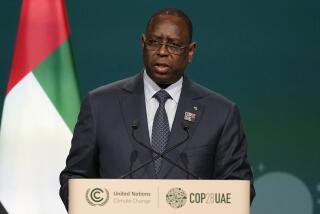Palestinian Election Is Postponed
- Share via
JERUSALEM — Palestinian Authority President Mahmoud Abbas, whose Fatah faction has been rattled by the growing political clout of the militant group Hamas, on Saturday postponed a parliamentary election that had been scheduled to take place in mid-July.
Hamas denounced the move, saying the delay harmed the Palestinian national interest, but carefully refrained from making any threat to respond with violence.
Abbas announced the postponement in a presidential decree, citing technical reasons. Voting for the Palestinian parliament was to take place on July 17, less than a month before Israel is scheduled to begin its withdrawal from the Gaza Strip.
In recent months, the Palestinian leader has been sparring with the parliament, which is dominated by Fatah, over procedures for selecting the candidates and conducting the voting.
Abbas wanted to field a largely national slate, which he believed would allow Fatah to put forth candidates who are younger, more progressive and less likely to be perceived as tied to corruption that was endemic during the era of Yasser Arafat.
But powerful old-guard parliamentary factions backed the idea of voting by district, a method that some entrenched politicians believe would allow them to benefit from clan ties and local influence. Hamas, as well, could benefit from such an arrangement.
No new date was set for the balloting, though it seemed unlikely to take place before the start of Israel’s withdrawal from Gaza, which is slated to start sometime around Aug. 15. Abbas said an election date would be set after talks with Palestinian lawmakers and consultations with rival political groups, including Hamas.
“Postponement was necessary to enable ourselves to finalize the legal measures and consultations between factions,” Abbas told Palestinian TV.
But, he added, “time is short.”
The election will be the first with Hamas candidates running for seats in the legislature, which was last chosen in 1996.
Hamas, formally known as the Islamic Resistance Movement, scored impressive results in municipal votes held in the wake of Arafat’s death. It is expected to do well in the parliamentary election, a prospect that has caused deep concern in Israel and considerable unease in Washington, which is seeking to promote democracy in the Middle East.
Hamas is a sworn enemy of the Jewish state, and its military wing has carried out dozens of suicide bombings in the Palestinians’ 4 1/2-year intifada.
An endorsement of Hamas by the Palestinian electorate, however, would not necessarily be a repudiation of the pragmatic stance Abbas has taken toward Israel. The group’s popularity is strongly bolstered by its image among Palestinians as being untainted by corruption.
Hamas also has built a loyal following, particularly among the poorest of the poor, by providing essential social services such as medical clinics, food handouts and schools. And in municipalities where it already wields power, Hamas has devoted considerable energy and attention to mundane civic matters such as repairs to potholed roads and sewage systems damaged in the conflict.
Speaking to reporters in the Gaza Strip, Hamas spokesman Sami abu Zuhri was critical of the decision to postpone the vote, saying it mainly had to do with “party considerations related to Fatah.”
He also said it could “affect the relationship between the Palestinian Authority and the resistance forces,” a veiled reference to the informal truce to which Hamas has adhered at Abbas’ behest.
In terms of Hamas rhetoric employed over the last four years, the rebuke was a fairly mild one. That could be because Hamas anticipates an even stronger showing if the vote takes place after the Israeli withdrawal from Gaza, which Hamas is determined to paint as a victory for its fighters.
Israeli officials declined to comment on the delay, characterizing it as an internal Palestinian affair. But some Israeli commentators said it pointed to a dangerous weakness on the part of Abbas, who is beset by Fatah infighting as well as the challenge from Hamas.
“I think it’s worrisome,” said Gil Feiler, an analyst at the Begin-Sadat Center for Strategic Studies at Bar-Ilan University. “It’s all a power game, and clearly Abbas is not well positioned in this.”
In Washington, White House spokesman Allen Abney said, “We have seen the reports and what is important here is that the Palestinians have peaceful, free and democratic elections when they have them.”
Abbas, 70, has defied both Israel and the U.S. by seeking to reach an accommodation with Hamas and other Palestinian militant groups rather than tackling them head-on. He has said such a confrontation would be tantamount to civil war.
Defenders of Abbas point out that his approach has yielded the longest period of calm since the outbreak of the intifada in September 2000. But detractors, mainly on the Israeli side, say the respite is merely allowing Hamas to reorganize and rearm.
In yet another example of the lawlessness with which Abbas is trying to cope, masked gunmen affiliated with his own Fatah faction briefly detained a Palestinian diplomat Saturday as he was crossing into the Gaza Strip, but released him unharmed. The gunmen said they were protesting hiring terms for an enlarged Palestinian police force in Gaza.
Times staff writer Judy Pasternak in Washington and special correspondents Fayed abu Shammaleh in Gaza City and Maher Abukhater in Ramallah contributed to this report.
More to Read
Sign up for Essential California
The most important California stories and recommendations in your inbox every morning.
You may occasionally receive promotional content from the Los Angeles Times.













